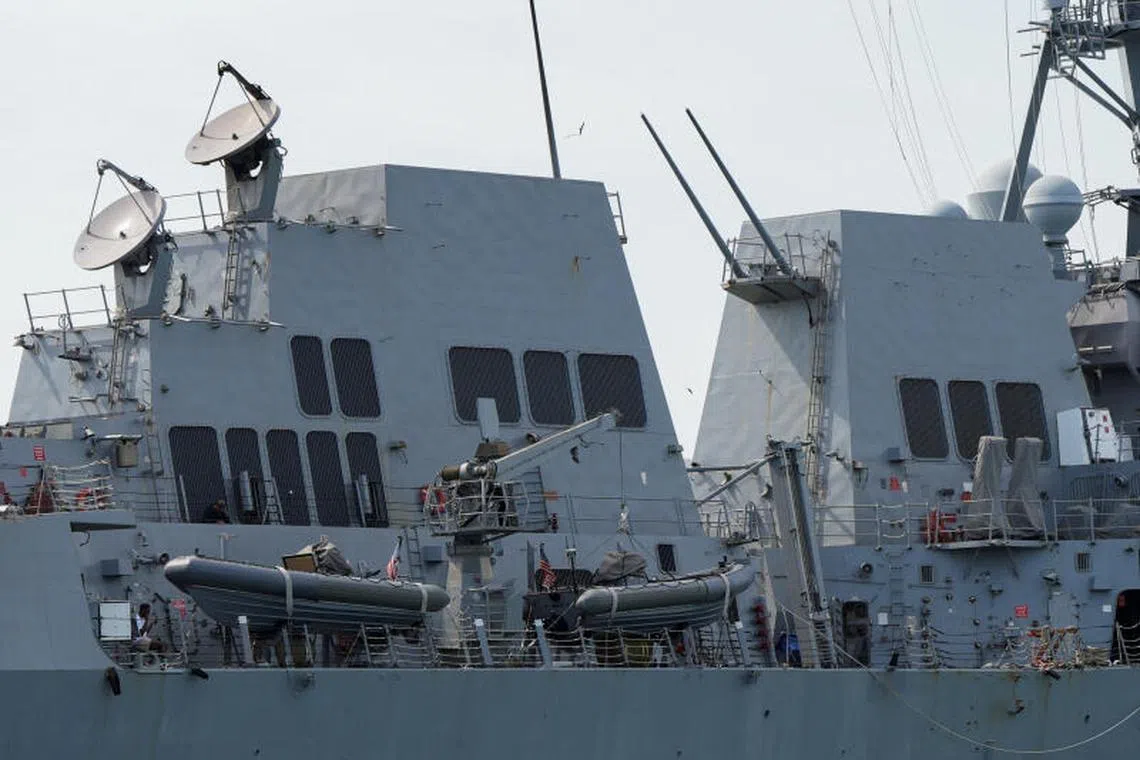Venezuela’s Maduro says US warships with 1,200 missiles targeting his country
Sign up now: Get ST's newsletters delivered to your inbox

Venezuela’s President Nicolas Maduro addressing the media in Caracas, Venezuela, on Sept 1.
PHOTO: REUTERS
CARACAS – Venezuelan President Nicolas Maduro said on Sept 1 that eight US military vessels with 1,200 missiles were targeting his country, which he declared to be in a state of “maximum readiness to defend” itself.
The United States, which accuses Mr Maduro of heading a drug cartel, has announced a deployment of warships
Yet Mr Maduro railed at a meeting with the international media in Caracas on Sept 1 against “the greatest threat that has been seen on our continent in the last 100 years” in the form of “eight military ships with 1,200 missiles and a submarine targeting Venezuela”.
One of the ships, a guided missile cruiser, was spotted going through the Panama Canal from the Pacific to the Caribbean on the night of Aug 29.
Mr Maduro said that “in response to maximum military pressure, we have declared maximum readiness to defend Venezuela”.
He said more than eight million Venezuelans have enlisted as reservists. Caracas has already announced increased patrols of its territorial waters.
Washington has doubled to US$50 million (S$64 million) a bounty
‘Bloodbath’
Known for his fiery, often anti-US tirades, Mr Maduro on Sept 1 said lines of communication with the United States have broken down, and vowed his country “will never give in to blackmail or threats of any kind”.
At the press conference, he warned that US Secretary of State Marco Rubio sought to lead US President Donald Trump “into a bloodbath... with a massacre against the people of Venezuela”.

US Navy guided missile destroyer USS Sampson DDG-102 docking near the entrance to the Panama Canal, amid a large build-up of US naval forces in and around the Southern Caribbean.
PHOTO: REUTERS
Caracas has said it would patrol its territorial waters and mobilise more than four million militia members in response to the US “threats”.
The US military deployment was welcomed, however, by Guyana’s President Irfaan Ali as “anything to eliminate any threat to our security”.
Georgetown and Caracas are engaged in a dispute over the oil-rich border region of Essequibo, which makes up two-thirds of Guyana’s territory but is also claimed by Venezuela.
The bilateral rhetoric has escalated since ExxonMobil discovered massive oil deposits a decade ago off the coast of Essequibo, which has been administered by Guyana for over 100 years.
‘Armed struggle’
Mr Maduro has been in Mr Trump’s crosshairs since the Republican’s first term from 2017 to 2021.
But Mr Trump’s policy of maximum pressure on Venezuela, including an oil embargo, has failed to dislodge Mr Maduro from power.
Analysts have told AFP the US military deployment was unlikely to result in any invasion or attack, but rather sought to ramp up pressure on Mr Maduro – who has repeatedly accused Mr Trump of attempting to bring about regime change.
Last week, Caracas petitioned the United Nations to intervene in the dispute by demanding “the immediate cessation of the US military deployment in the Caribbean”.
On Sept 1, Mr Maduro said Venezuela was prepared for “a period of armed struggle in defence of the national territory” in case of an attack. AFP


